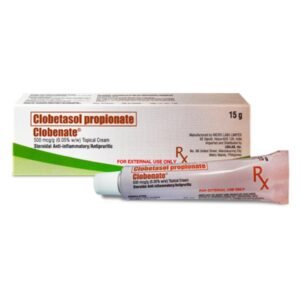CLOBETASOL + NEOMYCIN SULPHATE + MICONAZOLE NITRATE
Clobetasol: Clobetasol is a potent corticosteroid medication that is used to treat various inflammatory skin conditions such as eczema, psoriasis, dermatitis, and certain types of rashes. It belongs to a class of drugs called topical corticosteroids.
The mechanism of action of clobetasol involves reducing inflammation, itching, and redness by suppressing the immune response in the affected area. It achieves this by inhibiting the production of substances in the body that cause inflammation.
Clobetasol is available in different forms, including cream, ointment, lotion, foam, and gel. The specific form prescribed depends on the condition being treated and the affected area. It is usually applied topically, directly to the affected skin, and should not be used on the face, groin, or armpits unless specifically directed by a healthcare professional.
The dose of clobetasol will vary depending on the severity of the condition and the specific formulation being used. It is essential to follow the instructions provided by your healthcare provider or the directions on the product label. Generally, a thin layer is applied to the affected area once daily, and it is generally not recommended to use clobetasol for more than a few weeks at a time.
Like other corticosteroids, clobetasol can have potential side effects. Common side effects may include burning, itching, dryness, redness, or irritation of the skin at the application site. Long-term or excessive use of clobetasol may lead to skin thinning, discoloration, stretch marks, or increased hair growth. It is also possible to absorb enough of the medication through the skin to cause unwanted systemic effects, especially if used over a large area of the body or for an extended period.
It is crucial to follow the prescribed duration, quantity, and application instructions to minimize the risk of side effects. If side effects are severe or persistent, it is recommended to consult a healthcare professional.
Neomycin Sulphate: Neomycin sulfate is an antibiotic medication that is primarily used to treat or prevent bacterial infections. It belongs to the class of drugs known as aminoglycosides.
Neomycin works by disrupting the production of proteins in bacteria, thereby preventing their growth and survival. It is mainly effective against gram-negative bacteria but also has some activity against certain gram-positive bacteria.
This medication is commonly used in the form of eye drops to treat or prevent bacterial infections of the eye. It may also be used orally to treat infections in the intestine, such as traveler’s diarrhea, and as a topical treatment for skin infections. Neomycin is sometimes combined with other antibiotics to enhance its effectiveness.
The dose of neomycin sulfate can vary depending on the type and severity of the infection, as well as the age and weight of the individual. It is typically administered as eye drops or ointment for eye infections, as tablets or liquid for intestinal infections, and as a cream or ointment for skin infections. It is important to follow the dosage instructions provided by the healthcare professional or on the product label.
As with any medication, neomycin sulfate can cause certain side effects. Common side effects include skin irritation, redness, itching, and rash at the site of application. When taken orally, it may cause stomach upset, nausea, vomiting, and diarrhea. Rare but severe side effects may include allergic reactions, such as swelling of the face, lips, or throat, difficulty breathing, or hives. It is advisable to seek medical attention if any severe side effects occur.
It is important to note that neomycin sulfate is only effective against bacterial infections and has no activity against viral or fungal infections. It should not be used in self-diagnosis or self-treatment without the guidance of a healthcare professional.
Miconazole Nitrate: Miconazole Nitrate is an antifungal medication primarily used to treat fungal infections of the skin and nails. It can be found under various brand names, such as Monistat, Micatin, and Lotrimin.
The drug’s mechanism of action involves inhibiting the growth and reproduction of fungi by interfering with their cell membrane, leading to a disruption of their structure and function.
Miconazole Nitrate is commonly available as a cream, lotion, spray, or powder, depending on the intended use. It is generally applied to the affected area(s) of the skin or nails, following the instructions provided by the healthcare professional or as indicated on the product label. The frequency of application can vary depending on the severity of the infection.
As for side effects, some individuals may experience mild skin irritation, such as redness, itching, or a burning sensation at the site of application. These side effects are usually temporary and resolve on their own. However, if the irritation persists or worsens, it is recommended to consult a healthcare professional.
Although uncommon, more severe allergic reactions to Miconazole Nitrate can occur. Signs of these reactions can include rash, swelling, dizziness, or difficulty breathing. If any of these symptoms occur, immediate medical attention is necessary.
It is important to note that Miconazole Nitrate is for external use only. It should not be ingested or applied to the eyes, nose, mouth, or genitals unless specifically instructed by a healthcare professional. Pregnant or breastfeeding individuals should consult their doctor before using this medication, as its safety during these conditions has not been well-established.
As with any medication, it is advisable to consult a healthcare professional or read the product label for specific dosing instructions and precautions.

